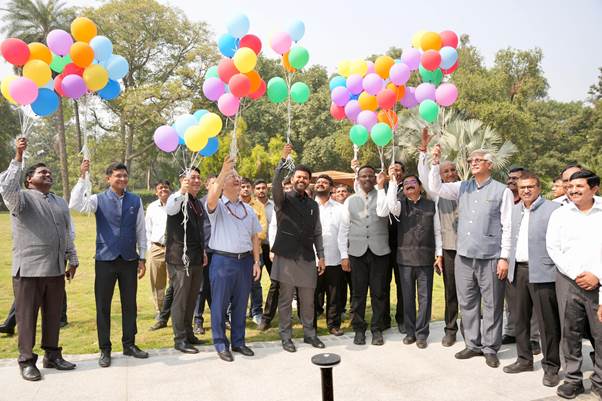Civil Aviation Minister Shri Ram Mohan Naidu along with MoCA Secretary and senior officials today attended a special event celebrating 8 successful years of #UDAN – Ude Desh Ka Aam Nagrik. The scheme has achieved significant milestones in advancing remote and regional connectivity.
The Minister, in his address, emphasized that UDAN has revolutionized the air travel connecting the remote parts of India to global destinations. Under the scheme, 601 routes and 86 airports are operationalised, and 14400000 passengers till now have been benefitted from the scheme.
The first RCS-UDAN flight was inaugurated by Prime Minister Shri Narendra Modi on April 27, 2017, connecting Shimla to Delhi. The scheme focuses on improving unserved air routes in underserved regions of the country and fulfilling the aspirations of the common citizens.
So far, the RCS-UDAN has facilitated travel of more than 144 lakh passengers, demonstrating its success in enhancing air travel accessibility.
The RCS-UDAN is contributing to the growth of the civil aviation industry as many new and successful airlines have come up in the last seven years. The scheme has helped airline operators to start up and develop a sustainable business model. Additionally, it’s providing opportunities to small regional airlines Flybig, Star Air, IndiaOne Air and Fly91 to scale up their businesses and their successful run is evidence of the fact that the scheme is creating an amiable ecosystem conducive to airline business.

The scheme’s incremental expansion has generated an escalating demand for new aircraft, concurrently broadening the spectrum of aircraft deployed. This augmentation encompasses a comprehensive range of aircraft and encompasses helicopters, seaplanes, 3-seat propeller planes, and jet planes. Presently, a diversified fleet, including Airbus 320/321, Boeing 737, ATR 42 and 72, DHC Q400, Twin Otter, Embraer 145 and 175, Tecnam P2006T, Cessna 208B Grand Caravan EX, Dornier 228, Airbus H130, and Bell 407 is actively serving on the RCS routes. The heightened demand for aircraft is substantiated by Indian carriers’ orders, which exceed 1,000 aircraft slated for delivery over the next 10-15 years, representing a significant augmentation of India’s existing fleet, which currently comprises approximately 800 planes operated by various airlines.
RCS-UDAN is not solely dedicated to offering last-mile connectivity to tier-2 and tier-3 cities; it also stands as a prominent contributor to the burgeoning tourism sector. UDAN 3.0 introduced tourism routes connecting several destinations in the Northeast region, while UDAN 5.1 is dedicated to expanding helicopter services in hilly regions to stimulate tourism, hospitality, and local economic growth.
This initiative has successfully connected destinations such as Khajuraho, Deoghar, Amritsar, and Kishangarh (Ajmer), which have substantial relevance in religious tourism. The entire Northeast region’s tourism industry is experiencing a considerable upsurge due to the introduction of Pasighat, Ziro, Hollongi, and Tezu airports, fostering greater accessibility.The Scheme also achieved another milestone by bringingAgatti Island on the Indian aviation map, further boosting tourism in Lakshadweep.
From Mundra (Gujarat) to Tezu in Arunachal Pradesh andKullu in Himachal Pradesh to Salem in Tamil Nadu, RCS-UDAN hasconnected 34 States/UTs across the length and breadth of the country. A total of 86 aerodromes have been operationalized under UDAN. Ten airports have been operationalized in the Northeast regionin addition to two heliports. Many airports that were operationalized under UDAN such as Darbhanga, Prayagraj, Hubli, Belgaum, Kannur, etc. have or may soon become sustainable with many non-RCS commercial flights operating from these airports.


Comments are closed.